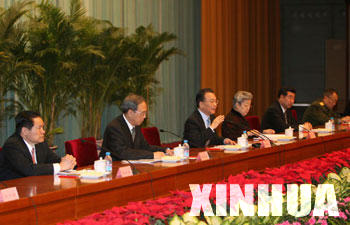China lays out new policies for finance industry
(Xinhua)Updated: 2007-01-21 09:00
China wrapped up the third national financial work conference on Saturday, unveiling a package of policies aimed at improving the country's financial health.
 Chinese Premier Wen Jiabao (3rd L) addresses the national financial work conference, which was held in Beijing, capital of China, between Jan. 19 and 20, 2007. [Xinhua] |
In a keynote speech to the meeting, which is held every five years, Premier Wen Jiabao highlighted a number of problems facing China's financial industry, including an accelerating international trade imbalance, poor governance of financial corporations and a defective rural financial system.
Wen said that China's financial industry had witnessed historical changes since the last conference was held in 2002. "However, quite a number of problems and contradictions still exist ... We must attach great importance (to the problems and contradictions) and take forceful means to solve them," he said.
The measures agreed by the State Council or cabinet, include allowing the China Development Bank, one of the nation's three policy banks, to take the lead in opening commercial operations ahead of the China Export and Import Bank and the Agricultural Development Bank of China.
Following the market listings of the three "big four" banks, namely the China Construction Bank, the Bank of China and the Industrial and Commercial Bank of China, the meeting also finalized the shareholding reform plan for the remaining Agricultural Bank of China (ABC) in an effort to bolster rural economy.
Wen said that the ABC reform must be carried out in a steady manner that would serve the financial demands of rural China.
Official figures revealed that only 60 percent of the 120 million rural households had access to bank loans. While Chinese farmers generated only 15 percent of the country's total bank loans and deposits, the per capita outstanding loan balance for rural residents is less than 5,000 yuan, only 10 percent of that for urban residents.
To remedy the situation, the meeting agreed upon a raft of principles such as facilitating rural financial reforms, moderately reducing the access threshold for financial institutions into the rural market, encouraging and supporting the establishment of diversified rural credit organizations including those engaged in small loans and pushing forward agricultural insurance.
Professor Justin Yifu Lin of the Beijing University said that the meeting had provided "crucial thoughts for future rural financial reforms".
He said that the next step China would take is to establish more specific regulations.
Regarding to the rapidly expanding foreign exchange reserves which hit 1.06 trillion U.S. dollars, Wen Jiabao said that China would steadily push forward the foreign exchange rates reform and actively explore and expand the use of massive stockpile.
He said that China would strengthen operation and management of foreign exchange reserves and facilitate the balance of international payment.
While China's economy maintained a double-digit growth, the country has seen a yawning wealth gap. The government said financial institutions would be encouraged to grant more support to the capital-hungry to small and medium-sized enterprises, self-innovation projects, public causes and the less developed regions.
The Cabinet also agreed to facilitate the fair competition between domestic and foreign financial institutions and advance financial collaboration between the mainland, Hong Kong and Macao.
David Dollar, director of the China Bureau of the World Bank, said that the meeting came at a critical time.
China promised to further open up its financial industry after wrapping up
the five-year grace period for its WTO entry, which would help China to build a
more open and competent financial system, he said.
|
||
|
||
|
|